
Top 5 Benefits of Salmon Oil for Dogs
September 29, 2023As a loving and responsible pet owner, you always look for ways to improve your furry friend's health and well-being. One supplement that has gained considerable attention in recent years is salmon oil for dogs. Derived from the nutrient-rich flesh of salmon, this natural oil is packed with essential omega-3 fatty acids, offering many benefits for your canine companion. In this article, we will explore what salmon oil for dogs is, what to consider when choosing a high-quality product, the top 5 benefits it provides, and how to introduce it into your dog's diet.
What is Salmon Oil for Dogs?
Salmon oil for dogs is a dietary supplement that is derived from the fatty tissues of salmon, which are known to be rich in omega-3 fatty acids. These essential fatty acids are crucial for a dog's overall health, as they cannot be produced naturally by their bodies. Salmon oil is commonly liquid and can be added to your dog's food or administered directly.
Top 5 Benefits of Salmon Oil for Dogs:

1. Promotes a Healthy Coat and Skin:
- Omega-3 fatty acids nourish the skin and reduce dryness, itchiness, and flakiness.
- Supports the production of natural oils, resulting in a lustrous, shiny coat.
- Anti-inflammatory properties help alleviate allergies, hot spots, and dermatitis.
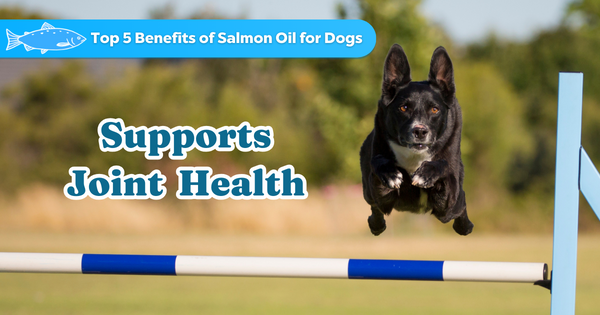
2. Supports Joint Health:
- Omega-3 fatty acids reduce joint inflammation and stiffness.
- Alleviates joint pain, improving mobility and comfort.
- Supports overall joint health, beneficial for senior dogs and those with arthritis or hip dysplasia.
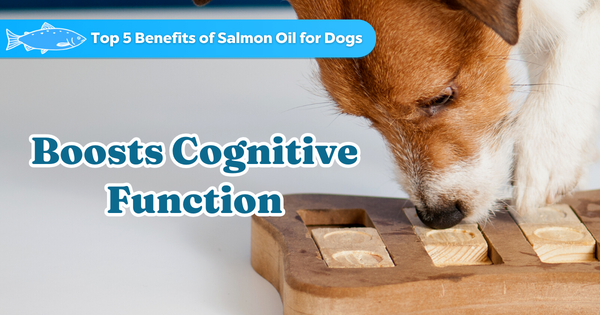
3. Boosts Cognitive Function:
- Omega-3 fatty acids enhance brain health and cognitive function.
- Supports memory, learning, and overall brain development.
- Especially beneficial for puppies during growth stages and senior dogs to maintain mental sharpness.
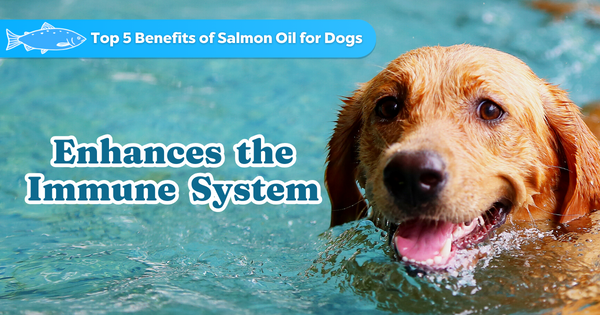
4. Enhances the Immune System:
- In blood vessels, omega-3 fatty acids have anti-inflammatory effects.
- Strengthens resistance to infections, allergies, and immune-related disorders.
- It supports the production of immune cells and regulates the inflammatory response.

5. Supports Cardiovascular Health:
- In blood vessels, omega-3 fatty acids have anti-inflammatory effects.
- It enhances blood circulation and helps prevent the formation of blood clots.
- Regulates blood pressure and cholesterol levels, supporting a healthy heart.
How to Start if You Want to Add Salmon Oil to Your Dog's Diet:
Consult Your Veterinarian

Before introducing any new supplement, it is always advisable to consult with your veterinarian. Your veterinarian can evaluate your dog's requirements and suggest the correct dosage.
Choose a High-Quality Salmon Oil

Select a reputable brand that meets the earlier quality, purity, and omega-3 content criteria.
Our salmon oil for dogs is a convenient and beneficial way to improve your furry friend's health. Packed with essential omega-3 fatty acids, our premium salmon oil offers a range of advantages for your dog's well-being.
Start Slowly
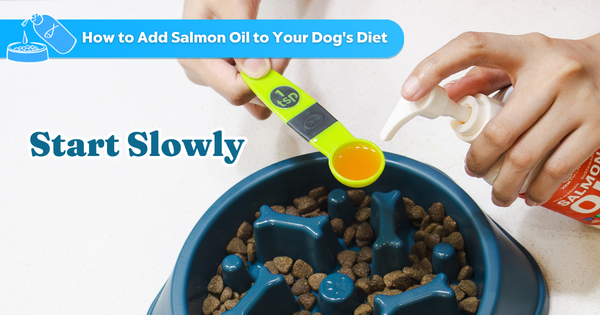
Begin with a small dosage and gradually increase it over time to allow your dog's system to adjust. Follow the recommended dosage guidelines provided by the manufacturer or your veterinarian.
Mix with Food
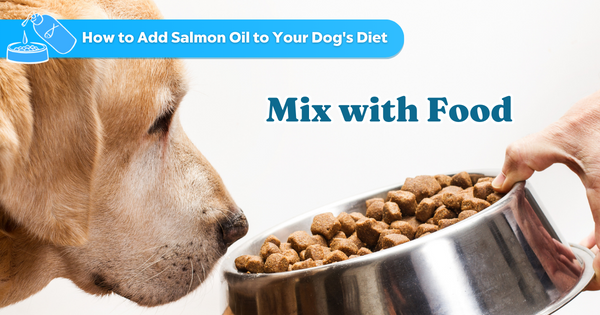
Add the recommended amount of salmon oil to your dog's regular food. Most dogs find the taste palatable and eagerly consume it.
Monitor the Results

Keep an eye on your dog's coat, skin, joint mobility, and overall well-being. Positive changes should become evident within a few weeks. If you have any concerns or observe any negative effects, seek advice from your veterinarian.
Conclusion
Adding salmon oil to your dog's diet can provide numerous health benefits, thanks to its rich omega-3 fatty acid content. This natural supplement can enhance your furry friend's overall well-being, from promoting a healthy coat and skin to supporting joint health and boosting cognitive function. By choosing a high-quality salmon oil and gradually introducing it into their diet, you can unlock the power of omega-3s and help your dog lead a happier, healthier life. Always consult with your veterinarian before making any changes to your dog's diet or supplement regimen.
